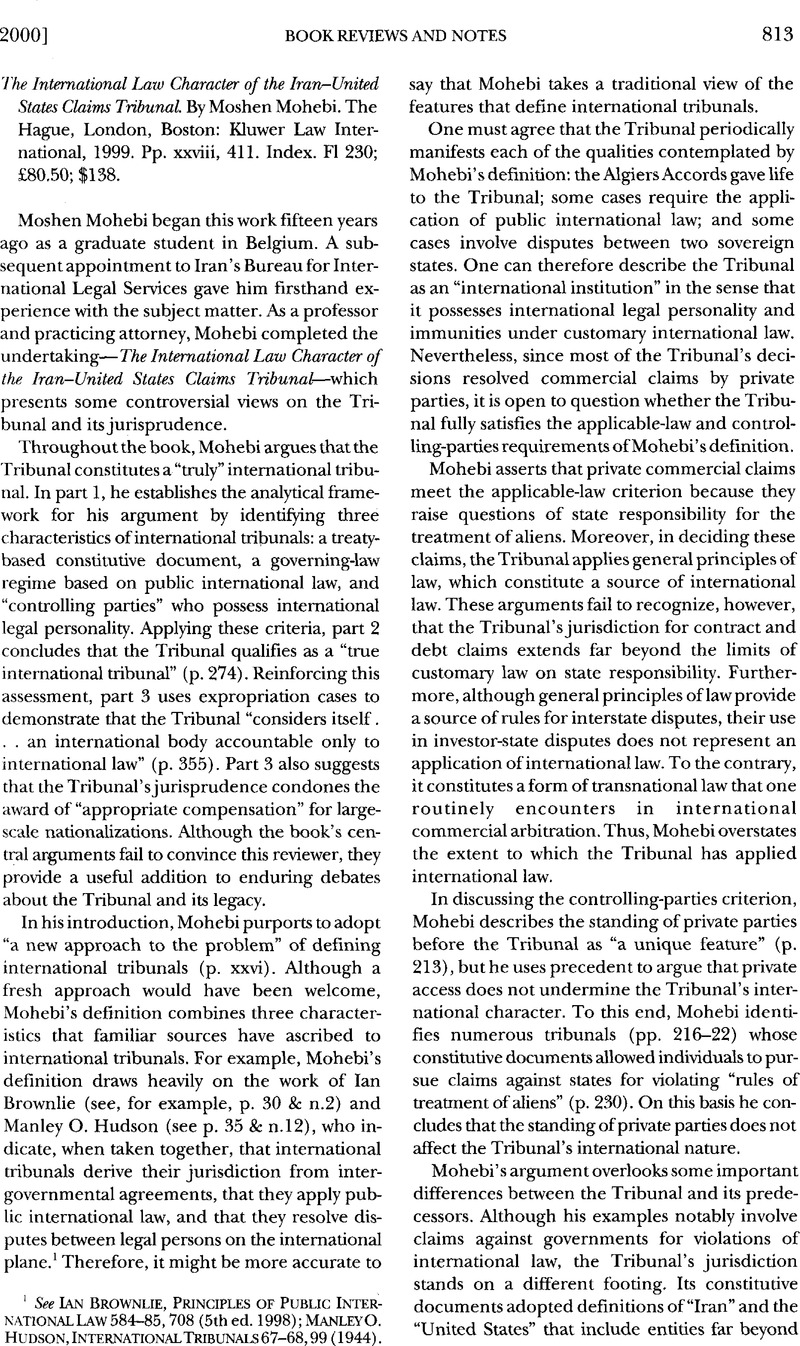No CrossRef data available.
Published online by Cambridge University Press: 27 February 2017

1 See Brownlie, Ian, Principles of Public International Law 584–85, 708 (5th ed. 1998)Google Scholar; Manley O., Hudson, International Tribunals 67–68, 99 (1944)Google Scholar.
2 See David D., Caron, The Nature of the Iran–United States Claims Tribunal and the Evolving Structure of International Dispute Resolution, 84 AJIL 104, 111 (1990)Google Scholar.
3 See id. at 128; cf. Stephen J., Toope, Mixed International Arbitration 395 (1990)Google Scholar (arguing that “full internationalisation of mixed arbitration would encourage complete politicisation, making the resolution of commercial disputes more difficult”).
4 See, e.g., Derek W., Bowett, State Contracts with Aliens: Contemporary Developments on Compensation for Termination or Breach, 1988 Brit. Y. B. Int’l L. 49, 69, 73 Google Scholar.
5 1 Iran-U.S. CI. Trib. Rep. 347 (1982). Technically, this case involved a discrete expropriation and not a large-scale nationalization.
6 8 Iran-U.S. CI. Trib. Rep. 373 (1985).
7 See id. at 391–92, 395 (Sep. Op. Holtzmann, J.); see also John R., Crook, Applicable Law in International Arbitration: The Iran-U.S. Claims Tribunal Experience, 83 AJIL 278, 301 (1989)Google Scholar.
8 4 Iran-U.S. CI. Trib. Rep. 96 (1983).
9 See id. at 105, 109.
10 See, e.g., Charles N., Brower, The Iran–United States Claims Tribunal, 224 Recueildes Cours 123, 386 (1990 V)Google Scholar.
11 See, e.g., Starrett Hous. Corp. v. Iran, 16 Iran-U.S. CI. Trib. Rep. 112, 222 (1987) (using an approximation instead of requesting an expert to make additional calculations because “prolongation of the already long proceedings . . . [was] unwise and unwarranted”); Gruen Assocs., Inc. v. Iran Hous. Co., 3 Iran-U.S. CI. Trib. Rep. 97, 107 (1983) (acknowledging that the award represented an estimate, but noting that precision would require “additional evidence, including the appointment of an expert, the cost of which in money and time seem[ed] of doubtful wisdom”).
12 Cf. Charles N., Brower & Jason D., Brueschke, The Iran-United States Claims Tribunal 661 (1998)Google Scholar (“The human desire of [presiding arbitrators] to ‘say yes’ to Iran from time to time cannot be .. . denied.”);
Daniel B., Magraw, The Tribunal in Jurisprudential Perspective, in The Iran-United States Claims Tribunal: Its Contribution to the Law of State Responsibility 1, 29, 33 (Richard B., Lillich & Daniel B., Magraw eds., 1998)Google Scholar (explaining that “the Tribunal has had to operate with an eye toward keeping both countries participating in the process,” and recognizing that many U.S. claimants felt that the Tribunal’s awards compromised significantly on the issue of valuation).
13 15 Iran-U.S. CI. Trib. Rep. 189 (1987).
14 21 Iran-U.S. CI. Trib. Rep. 79 (1989); see David P., Stewart, Compensation and Valuation Issues, in The Iran–United States Claims Tribunal: Its Contribution to the Law of State Responsibility, supra note 12, at 325, 347 Google Scholar (“highly questionable”); Brower & Brueschke, supra note 12, at 512 (“squarely rejected”).
15 Petrolane, Inc. v. Iran, 27 Iran-U.S. CI. Trib. Rep. 264, 265 (1991); Phillips Petroleum Co. Iran v. Iran, 21 Iran-U.S. CI. Trib. Rep. 285, 294 (1990) (separate statement of George H. Aldrich).